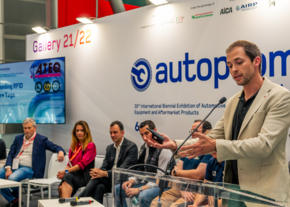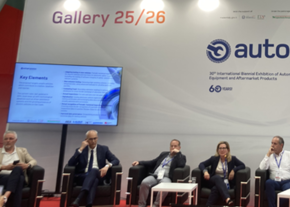
24/01/2017
Connected cars: new European case studies and proposals from German manufacturers. Another threat to independence?
Massimo Brunamonti
The work of the European Commission on the definition of a standardized vehicle data access platform continues without let up. A study is, in fact, currently evaluating the feasibility of the proposals on the table. Meanwhile, German manufacturers and component suppliers have signed an agreement to support a system in which all data will have to pass through a car manufacturer's portal, which, on paper, meets all the free-competition policy requirements, but in reality is causing many sleepless nights for a number independent workshops.
It seems that issues such as access to data and vehicle resources, the so-called "connected car," have finally come under the magnifying lens. The European Commission recently announced a study, entitled "Study on access to on-board data and resources", and entrusted it to a specialized agency ,TRL (Transport Research Laboratory). The study aims to make a further step forward in the Decision making process relating to standardized access platforms to vehicle data (C-ITS platform), as requested by the European Parliament, by analyzing from all points of view (legal, civil, technical and economic) the three possible solutions identified with the help of some of the industry’s major players, including EGEA.
Of these the first consists of a fully integrated open platform in the vehicle. The second is a standard interface that will connect to "nomadic" devices, such as smartphones and their apps. The third and final solution is represented by external servers in the form of so-called ExVe (extended vehicle) or a neutral shared server or B2B access used by car manufacturers.
The purpose of the study is to determine the viability of all the existing solutions. The need for a specific study comes from the vastness of the topic, as outlined by the legislator, which requires an in-depth point of view on, not so many technical aspects, as much as on data security, guaranteed access, non-discriminatory practices and privacy. Not to mention the estimated cost / benefit ratio, decisive for the success of the project.
During the same period a further announcement was made about the signing of a "common position" agreement in Germany by the association of car manufacturers (VDU) and a trio of primary parts suppliers: Bosch, Hella Guttman and Continental, in relation to access to data and in-vehicle resources. The agreement, which the signatories declare to be compliant with security requirements, privacy and non-discriminatory regulations, was presented to the German government and was later announced to the European Commission as part of the C-ITS initiative.
The agreement states that car manufacturers responsible for the quality and integrity of the data, are the main system administrators and as such are responsible for the production and transfer of data through an OEM B2B interface. Third parties can access such data directly or through "neutral server" stipulating appropriate access contracts. In this way, says the agreement, any supplier can offer any kind of service in various fields: whether navigation, road safety, data security, entertainment, e-commerce, etc. Third party access to the OEM B2B interface will be based on specific contracts.
As for information on diagnosis and vehicle repair, the agreement provides for the standard compliant maintenance protocol for both the OBD and OBD2 interfaces, , while reserving the right to manufacturers of specific initiatives to protect the integrity of the vehicle during operations.
The data produced by manufacturers are classified in 5 categories: data related to road safety, data on communal services, data on manufacturer-specific services, data for the analysis of vehicle components and personal data. Each category interests a specific sector: the car repair sector, for example, is interested in services related to communal data.
The position of VDA, Bosch, Hella Guttman and Continental on the matter has many implications in the aftermarket world and all operators will have to analyze it very carefully. Meanwhile, it will be important to see how much and how the OBD interface will still be in use. How "deep" the level of diagnostic and repair data via OBD will be? What will become of local diagnosis? Will reverse engineering still be possible? The, not so remote, possibility of a transfer of many of the technical data to a management service through the B2B interface may actually prevent access, for example, to real-time data.
The agreement repeatedly emphasizes the compliance of any possible solution to EU guidelines regulating free and fair competition, security and privacy: certified and secure data under the manufacturers' responsibility, protection of privacy and access to "honest" non-discriminatory costs. Nevertheless, the framework is rather complex and expensive. It is no coincidence in fact that neutral servers have been introduced for third party access, with the aim of not having to force each individual trader to build or buy its own server. But whether the neutral server can or wants to offer reasonably priced access remains to be seen. From the standpoint of an independent car repair workshop, or equipment manufacturer, the doubts are still quite strong especially when you consider the difference in power with, for example, the subscribers of the agreement.
The "common position" agreement is very well structured and suitably discussed, therefore the chances for a positive response from the political world is rather high, considering the benefits in terms of standardization and data maintenance. It will be interesting to see the reaction of the DG Connect of the competent European Commission in the field of data exchange. The question is how much will the DG Connect be sensitive to primary issues such as free competition, which is crucial in the car repair sector. The associations will then have to assess very carefully whether to resort in the future to the Competition Authorities.
Of these the first consists of a fully integrated open platform in the vehicle. The second is a standard interface that will connect to "nomadic" devices, such as smartphones and their apps. The third and final solution is represented by external servers in the form of so-called ExVe (extended vehicle) or a neutral shared server or B2B access used by car manufacturers.
The purpose of the study is to determine the viability of all the existing solutions. The need for a specific study comes from the vastness of the topic, as outlined by the legislator, which requires an in-depth point of view on, not so many technical aspects, as much as on data security, guaranteed access, non-discriminatory practices and privacy. Not to mention the estimated cost / benefit ratio, decisive for the success of the project.
During the same period a further announcement was made about the signing of a "common position" agreement in Germany by the association of car manufacturers (VDU) and a trio of primary parts suppliers: Bosch, Hella Guttman and Continental, in relation to access to data and in-vehicle resources. The agreement, which the signatories declare to be compliant with security requirements, privacy and non-discriminatory regulations, was presented to the German government and was later announced to the European Commission as part of the C-ITS initiative.
The agreement states that car manufacturers responsible for the quality and integrity of the data, are the main system administrators and as such are responsible for the production and transfer of data through an OEM B2B interface. Third parties can access such data directly or through "neutral server" stipulating appropriate access contracts. In this way, says the agreement, any supplier can offer any kind of service in various fields: whether navigation, road safety, data security, entertainment, e-commerce, etc. Third party access to the OEM B2B interface will be based on specific contracts.
As for information on diagnosis and vehicle repair, the agreement provides for the standard compliant maintenance protocol for both the OBD and OBD2 interfaces, , while reserving the right to manufacturers of specific initiatives to protect the integrity of the vehicle during operations.
The data produced by manufacturers are classified in 5 categories: data related to road safety, data on communal services, data on manufacturer-specific services, data for the analysis of vehicle components and personal data. Each category interests a specific sector: the car repair sector, for example, is interested in services related to communal data.
The position of VDA, Bosch, Hella Guttman and Continental on the matter has many implications in the aftermarket world and all operators will have to analyze it very carefully. Meanwhile, it will be important to see how much and how the OBD interface will still be in use. How "deep" the level of diagnostic and repair data via OBD will be? What will become of local diagnosis? Will reverse engineering still be possible? The, not so remote, possibility of a transfer of many of the technical data to a management service through the B2B interface may actually prevent access, for example, to real-time data.
The agreement repeatedly emphasizes the compliance of any possible solution to EU guidelines regulating free and fair competition, security and privacy: certified and secure data under the manufacturers' responsibility, protection of privacy and access to "honest" non-discriminatory costs. Nevertheless, the framework is rather complex and expensive. It is no coincidence in fact that neutral servers have been introduced for third party access, with the aim of not having to force each individual trader to build or buy its own server. But whether the neutral server can or wants to offer reasonably priced access remains to be seen. From the standpoint of an independent car repair workshop, or equipment manufacturer, the doubts are still quite strong especially when you consider the difference in power with, for example, the subscribers of the agreement.
The "common position" agreement is very well structured and suitably discussed, therefore the chances for a positive response from the political world is rather high, considering the benefits in terms of standardization and data maintenance. It will be interesting to see the reaction of the DG Connect of the competent European Commission in the field of data exchange. The question is how much will the DG Connect be sensitive to primary issues such as free competition, which is crucial in the car repair sector. The associations will then have to assess very carefully whether to resort in the future to the Competition Authorities.








